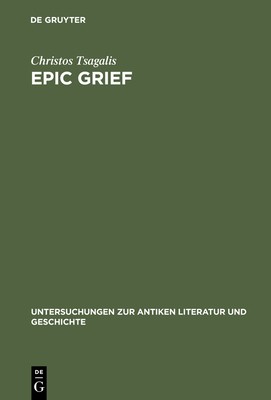
- We will send in 10–14 business days.
- Author: Christos Tsagalis
- Publisher: De Gruyter
- Year: 2012
- Pages: 240
- ISBN-10: 311017944X
- ISBN-13: 9783110179446
- Format: 15.6 x 23.4 x 1.4 cm, hardcover
- Language: English
- SAVE -10% with code: EXTRA
Reviews
Description
This study of the gooi or personal laments in Homer´s Iliad once and for all articulates the poetic techniques regulating this type of speech. Going beyond the tendency to view lament as a repetitive and group-based activity, this work shows instead the primacy of the goos, a sub-genre which the Iliad has produced by absorbing the funerary genre of lament. Oral theory, narratology, semiotics, rhetorical analysis are deftly applied to explore the ways personal laments develop principal epic themes and unravel narrative threads weaving the thematical texture of the entire Iliad (and beyond): the wrath of Achilles, the deaths of Patroclus and Hector, the grief of Achilles and his future death, the foreshadowing of Troy´s destruction.
Winner of the Annual Award in Classics (2007) of the Academy of Athens.
EXTRA 10 % discount with code: EXTRA
The promotion ends in 15d.13:56:34
The discount code is valid when purchasing from 10 €. Discounts do not stack.
- Author: Christos Tsagalis
- Publisher: De Gruyter
- Year: 2012
- Pages: 240
- ISBN-10: 311017944X
- ISBN-13: 9783110179446
- Format: 15.6 x 23.4 x 1.4 cm, hardcover
- Language: English English
This study of the gooi or personal laments in Homer´s Iliad once and for all articulates the poetic techniques regulating this type of speech. Going beyond the tendency to view lament as a repetitive and group-based activity, this work shows instead the primacy of the goos, a sub-genre which the Iliad has produced by absorbing the funerary genre of lament. Oral theory, narratology, semiotics, rhetorical analysis are deftly applied to explore the ways personal laments develop principal epic themes and unravel narrative threads weaving the thematical texture of the entire Iliad (and beyond): the wrath of Achilles, the deaths of Patroclus and Hector, the grief of Achilles and his future death, the foreshadowing of Troy´s destruction.
Winner of the Annual Award in Classics (2007) of the Academy of Athens.


Reviews